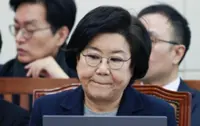WASHINGTON: The nominee to be the next US ambassador to Malaysia said on Tuesday he saw the potential for the United States to expand cooperation with the South-East Asian country in diversifying supply chains for rare earths and other critical minerals.
Edgard Kagan, a career diplomat who is currently the senior official for East Asia at the White House National Security Council, told his Senate confirmation hearing that developing new sources for critical minerals to ensure reliable supply chains was a very high priority for the Biden administration.





